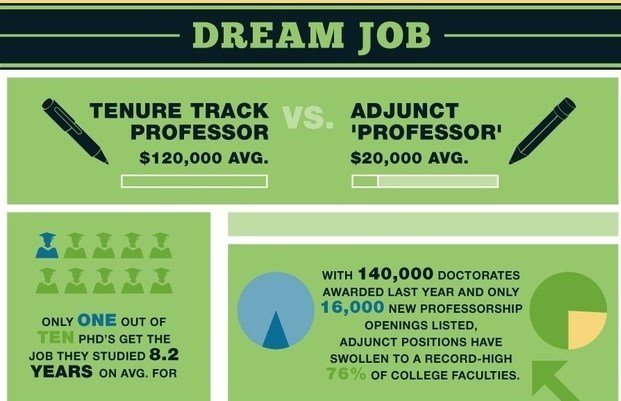Education
Adjunct Faculty: Straddling the Poverty Line

(See full infographic at OnlinePhdPrograms)
Driving a 15-year-old car 70 miles a day between three different college campuses took a toll on my ride – and on me. I was teaching as adjunct professor at three different L.A. community colleges. An adjunct is a part-time professor who is hired on a contractual basis rather than being given tenure and a permanent position. Many universities hire large numbers of adjunct faculty members because they are flexible and cheaper to maintain than traditional full-time faculty members.
I had no health insurance, no savings and no other financial resources, so every penny went to rent, car repairs and food. I was expected to hold office hours, but the colleges where I taught did not provide office space for adjuncts – I had nowhere to meet students or grade papers on campus. This compromised my students’ educational experience and placed a burden on my health, car and finances. Most galling: At one college, adjuncts were not allowed to use the faculty restroom, which included a lounge area. Ultimately, I became so delinquent in repaying my student loans that I left teaching, a job I loved, to regain financial stability.
Today 70 percent of American college and university instructors are adjunct faculty. In the past, all colleges needed at least a 70 percent full-time/30 percent adjunct ratio to be accredited. Some universities responded to this requirement by creating full-time non-tenure track faculty positions to meet accreditation standards.
Other colleges did not, leaving most of the classroom teaching to adjunct faculty. Because many adjuncts are “freeway fliers,” colleges rely on adjuncts who have less investment in encouraging educational excellence — not because they don’t care, but because many adjuncts are working at multiple campuses in order to stay above the poverty line. As a result, higher education today, once a path to the American Dream for both students and instructors, is on its way to becoming a dead-end highway. In order to provide a better educational experience for students – and better working conditions for adjuncts who teach those students – every educator, non-tenured and tenured, must stand up for students, themselves and for their colleagues.
The Service Employees International Union’s Adjunct Action campaign is an essential step forward. An SEIU symposium, Education and Equity: Valuing Higher Education and the Role of Adjunct Professors, takes place Saturday, November 2. This event invites all educators from colleges and universities throughout Southern California to discuss the realities of adjunct teaching and how working conditions for adjuncts impact higher education. Featured speakers include Lillian Taiz, President of the California Faculty Association and Gary Rhoades, Director of the Center for the Study of Higher Education, University of Arizona.
When: Saturday, November 2, 11 a.m.-4 p.m.
Where: Japanese American Museum, 100 N. Central Ave., downtown Los Angeles.
To Attend: Registration begins 10 a.m. A light breakfast and lunch will be served and parking is provided. RSVP at https://seiu.me/laadjuncts.

-

 Latest NewsFebruary 3, 2026
Latest NewsFebruary 3, 2026Amid the Violent Minnesota Raids, ICE Arrests Over 100 Refugees, Ships Many to Texas
-

 Featured VideoFebruary 4, 2026
Featured VideoFebruary 4, 2026Protesters Turn to Economic Disruption to Fight ICE
-

 The SlickFebruary 2, 2026
The SlickFebruary 2, 2026Colorado May Ask Big Oil to Leave Millions of Dollars in the Ground
-

 Column - State of InequalityFebruary 5, 2026
Column - State of InequalityFebruary 5, 2026Lawsuits Push Back on Trump’s Attack on Child Care
-

 Column - California UncoveredFebruary 6, 2026
Column - California UncoveredFebruary 6, 2026What It’s Like On the Front Line as Health Care Cuts Start to Hit
-

 The SlickFebruary 10, 2026
The SlickFebruary 10, 2026New Mexico Again Debates Greenhouse Gas Reductions as Snow Melts
-

 Latest NewsFebruary 12, 2026
Latest NewsFebruary 12, 2026Trump Administration ‘Wanted to Use Us as a Trophy,’ Says School Board Member Arrested Over Church Protest
-

 Latest NewsFebruary 10, 2026
Latest NewsFebruary 10, 2026Louisiana Bets Big on ‘Blue Ammonia.’ Communities Along Cancer Alley Brace for the Cost.

